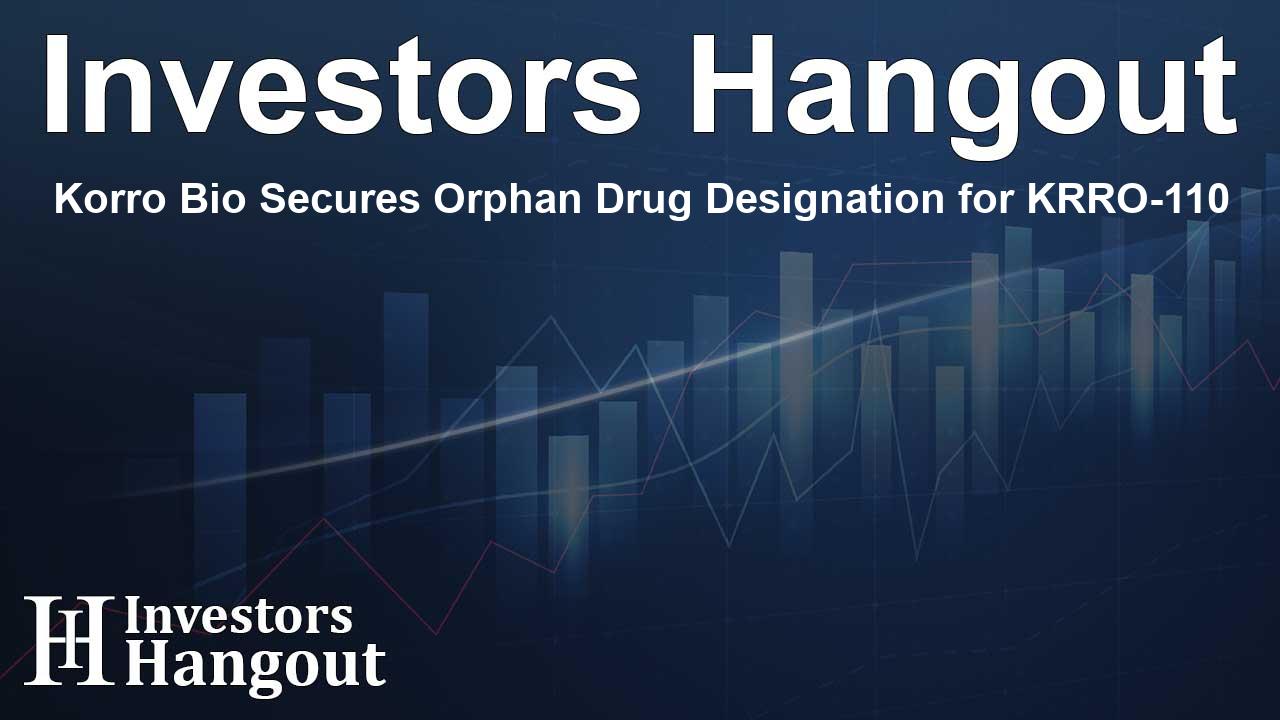Korro Bio Secures Orphan Drug Designation for KRRO-110

Korro Bio Achieves Milestone with Orphan Drug Designation
In a significant advancement for genetic medicine, Korro Bio, Inc. (Nasdaq: KRRO) has been granted orphan drug designation by the European Medicines Agency (EMA) for KRRO-110, its investigational treatment targeting Alpha-1 Antitrypsin Deficiency (AATD). This designation reflects the pressing need for novel therapies for patients grappling with this genetic disorder.
Expert Insights on the Designation
Kemi Olugemo, MD, Chief Medical Officer at Korro, expressed the importance of this designation, stating, "The EMA orphan drug designation for KRRO-110 is a landmark moment for Korro. It underscores our mission to bring innovative therapeutic solutions to those seeking new, disease-modifying treatments for AATD." The positive feedback from the EMA follows promising preclinical results, positioning KRRO-110 as a potential leader in the AATD therapy landscape.
Previous Milestones and Current Trials
Earlier this year, KRRO-110 also received orphan drug designation from the U.S. Food and Drug Administration, which further solidified its path toward regulatory approval. Currently, KRRO-110 is being studied in the Phase 1/2a REWRITE clinical trial aimed at evaluating its safety and efficacy in AATD patients. An interim analysis is anticipated later this year, keeping stakeholders excited about its prospects.
Understanding AATD and the Implications of KRRO-110
AATD is a serious condition characterized by a genetic mutation in the SERPINA1 gene, leading to significant health issues, including pulmonary emphysema and liver damage. The introduction of KRRO-110, a first-of-its-kind RNA editing oligonucleotide, represents a novel approach in correcting the underlying genetic fault by restoring the natural production of alpha-1 antitrypsin protein in the body. This innovative therapy could significantly alleviate some of the debilitating effects of AATD.
Overview of the REWRITE Clinical Trial
The REWRITE study is a dual-phase clinical trial investigating the safety and tolerability of KRRO-110 in participants, including healthy individuals and those suffering from AATD. By concentrating on pharmacokinetics and pharmacodynamics, researchers aim to pinpoint the optimal dosing for efficacy. Results from the first part of the study, which involves single ascending doses, are expected soon.
Korro Bio's Innovative Approach to Genetic Medicine
Korro Bio focuses on pioneering RNA editing genetic medicines, adopting a cutting-edge platform known as Oligonucleotide Promoted Editing of RNA (OPERA). This technology enables the company to provide precise edits at the RNA level, an approach that could yield enhanced treatment outcomes without permanent alterations to DNA. Through this innovative methodology, Korro aims to expand access to genetic therapies while minimizing safety concerns.
Future Developments and Corporate Communication
Korro Bio is committed to keeping its investors and the public informed about its progress and clinical advancements. The company utilizes its Investor Relations website and platforms like LinkedIn and X (formerly Twitter) to share essential updates and announcements.
Frequently Asked Questions
What is KRRO-110?
KRRO-110 is an investigational RNA editing therapy developed by Korro Bio for the treatment of Alpha-1 Antitrypsin Deficiency.
What does orphan drug designation mean?
This designation is granted to drugs intended for the treatment of rare diseases, providing incentives like regulatory support and market exclusivity once approved.
What is the REWRITE clinical trial?
The REWRITE trial is a clinical study assessing the safety and tolerability of KRRO-110 in both healthy volunteers and patients with AATD.
When can we expect results from the REWRITE study?
Interim results from part one of the REWRITE study are expected in the latter half of the year, with the trial's completion anticipated in the following year.
How does KRRO-110 work?
KRRO-110 targets the SERPINA1 gene's RNA, aiming to correct mutations that cause AATD, thereby restoring normal levels of the essential protein that protects the lungs and liver.
About The Author
Contact Logan Wright privately here. Or send an email with ATTN: Logan Wright as the subject to contact@investorshangout.com.
About Investors Hangout
Investors Hangout is a leading online stock forum for financial discussion and learning, offering a wide range of free tools and resources. It draws in traders of all levels, who exchange market knowledge, investigate trading tactics, and keep an eye on industry developments in real time. Featuring financial articles, stock message boards, quotes, charts, company profiles, and live news updates. Through cooperative learning and a wealth of informational resources, it helps users from novices creating their first portfolios to experts honing their techniques. Join Investors Hangout today: https://investorshangout.com/
The content of this article is based on factual, publicly available information and does not represent legal, financial, or investment advice. Investors Hangout does not offer financial advice, and the author is not a licensed financial advisor. Consult a qualified advisor before making any financial or investment decisions based on this article. This article should not be considered advice to purchase, sell, or hold any securities or other investments. If any of the material provided here is inaccurate, please contact us for corrections.
